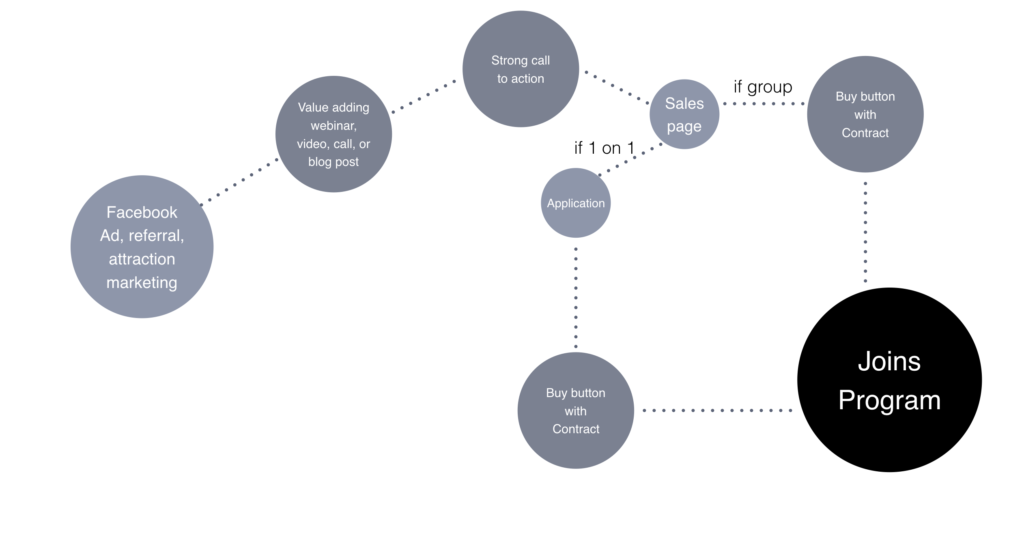
This post is all about coaching.
Coaching
Starting a coaching business can be a rewarding and fulfilling career path, but it can also be challenging to get started.
It is not about shiny websites or the perfect photoshoot.
In order to have a successful coaching business that consistently get clients, you need the right strategy.
This guide is designed to provide you with the knowledge and tools you need to start and run a successful coaching business.
Define what type of coaching you want to offer
First and foremost, it is important to define what type of coaching you want to offer.
Coaching can encompass a wide range of topics, such as career development, life coaching, relationship coaching, and more.
Consider what area you have the most experience and expertise in and focus on that.
Figuring out what type of coach you want to be and what type of clients you want to serve is an important step in starting a successful coaching business.
The first step is to reflect on your own experiences, skills, and passions.
Consider what areas of coaching you are most interested in and what you have the most experience and expertise in.
This will help you to determine the type of coaching you want to offer.
Once you have a general idea of the type of coaching you want to offer, it’s important to do some research. Look into the different types of coaching that are currently in demand and see what resonates with you.
This will give you a better understanding of the market and the types of clients you will be working with.
Click here to learn more about a career change to coaching.
It’s also important to consider the type of clients you want to work with. Think about their needs, goals, and what you can offer them.
Consider what type of clients you have had the most success working with in the past and what type of clients you enjoy working with the most.
Another important aspect to consider is the type of coaching delivery you want to offer. Some coaches prefer to work with clients in person, while others prefer to work online.
Consider what type of coaching delivery you feel most comfortable with and what will work best for the type of clients you want to serve.
Once you have a clear idea of what type of coach you want to be and what type of clients you want to serve, it’s important to communicate this to potential clients. This will help to attract the right clients to your business.
Figuring out what type of coach you want to be and what type of clients you want to serve is a process of self-reflection and research.
Reflect on your experiences, skills, and passions and do your research on the market and the types of clients you want to work with.
Consider what type of coaching delivery you want to offer to attract the right clients to your business.
Develop Your Unique Selling Proposition
Once you have a clear idea of what type of coaching you want to offer, it’s time to develop your unique selling proposition (USP). Your USP is what sets you apart from other coaches and is essential to attracting clients.
Consider what makes you unique as a coach, and how you can communicate this to potential clients.
Click here for coaching business tips.
The first step in developing your USP is to identify your strengths as a coach. Consider what makes you unique, such as your background, experiences, and expertise.
Think about what sets you apart from other coaches and how you can communicate this to potential clients.
Next, consider your target market. Who are your ideal clients and what are their needs? What are the pain points they are facing and how can you help them to overcome them? Your USP should address these needs and communicate how you can help.
Once you have a clear understanding of your strengths and target market, it’s time to craft your message. Keep it simple and clear, and make sure it’s communicated consistently across all your marketing materials. Your USP should be easy to understand, memorable and convey the value you bring to your clients.
In addition to crafting your message, it’s also important to back up your USP with evidence.
Share testimonials, case studies, and results from previous clients to demonstrate the value you bring.
Click here for a marketing plan sample.
This will help to build trust with potential clients and make it more likely that they will choose to work with you.
Lastly, it’s important to keep your USP current and relevant. The coaching industry and the needs of clients are constantly changing, so it’s important to review and update your USP regularly to ensure it stays relevant and effective.
Developing a unique selling proposition is essential for attracting and retaining clients in the coaching industry.
Identify your strengths as a coach, consider your target market, craft your message, back it up with evidence and keep it current.
By having a clear and compelling USP, you will be able to stand out in the market and attract the right clients for your coaching business.
Develop a marketing plan
After defining your USP, it is important to develop a marketing plan. This plan should include strategies for reaching potential clients, such as networking, social media, and content marketing. It is also important to set goals for your business and track your progress towards achieving them.
Click here to learn all about how to get more clients.
Establish Your Pricing Strategy
Another key aspect to starting a successful coaching business is to establish your pricing strategy.
This can be one of the most difficult parts of starting a business, but it is also one of the most important. Determine what your services are worth and set prices accordingly.
Be sure to take into account your expenses and the value you bring to your clients.
Click here for more details on how to price your coaching services.
Delivering Your Coaching Services
When it comes to delivering your coaching services, it’s important to have a structured approach in place. This includes creating a coaching agreement and establishing clear boundaries with your clients.
It’s also essential to have a system in place for scheduling sessions and managing client interactions.
Click here to learn all about the top coaching business tools that you really need.
Build Relationships With Your Clients
In addition to delivering your coaching services, it’s also important to focus on building relationships with your clients.
This includes staying in touch with clients even after a coaching engagement ends, and keeping track of their progress.
Building strong relationships with your clients will help to ensure that they continue to work with you, and will also help to attract new clients through word-of-mouth.
Building relationships with coaching clients is essential for creating a successful coaching experience. Here are some tips for building strong relationships with your clients:
- Listen actively: One of the most important things a coach can do is to truly listen to their clients. This means not just hearing what they are saying, but also paying attention to their body language, tone of voice, and nonverbal cues.
- Show empathy: Empathy is key to building trust and rapport with clients. It allows you to understand their perspective and connect with them on a deeper level.
- Set clear boundaries and expectations: Establishing clear boundaries and expectations from the start helps to create a sense of trust and respect between you and your client.
- Be reliable and consistent: Clients need to feel like they can count on you, so it’s important to be reliable and consistent in your communication and actions.
- Show genuine interest: Showing genuine interest in your clients’ lives and well-being will help to build trust and a sense of connection.
- Give feedback and be honest: Giving honest and constructive feedback to clients will help them to see their own progress and make improvements.
- Show gratitude: Showing gratitude for your clients’ trust and effort will make them feel valued and appreciated.
By building strong relationships with your clients, you can create a positive coaching experience that will help them to achieve their goals and make lasting changes in their lives.
Continue Learning As A Coach
Finally, it’s important to continue learning and developing as a coach.
This includes staying up-to-date with the latest coaching techniques and strategies, as well as seeking out opportunities for professional development.
It’s also important to be open to feedback and to use it to improve your coaching skills.
Click here to learn all about your coaching business plan.

Starting a coaching business can be a challenging and rewarding endeavor.
By following the tips outlined in this guide, you will be well on your way to establishing a successful coaching business.
Remember to define your USP, develop a marketing plan, establish your pricing strategy, deliver your coaching services in a structured way, focus on building relationships with your clients and continue learning and developing as a coach.
This post was all about coaching.









